Recent Water Damage Posts
Future-proof Your Home: The Importance of Waterproofing and Water Damage Restoration
6/5/2023 (Permalink)
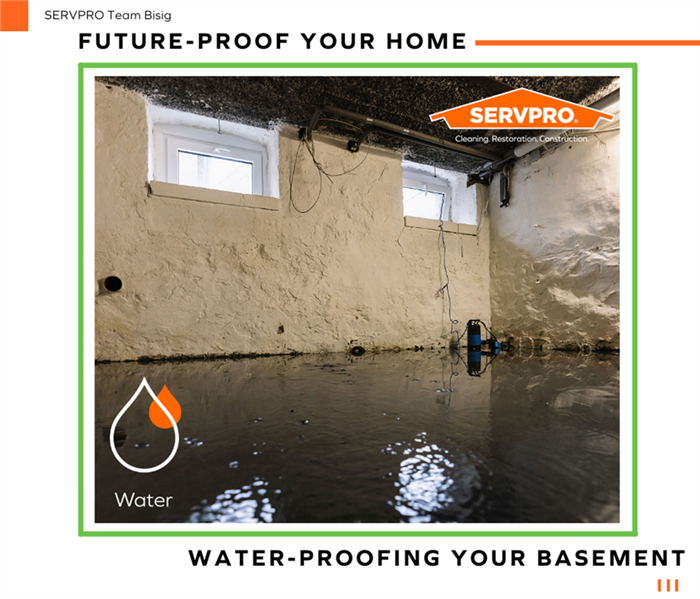 SERVPRO of Forsyth & Dawson Counties is here to serve you 24/7/365 whether you live in Big Creek, Cumming, Vickery, Chestatee or anywhere in between.
SERVPRO of Forsyth & Dawson Counties is here to serve you 24/7/365 whether you live in Big Creek, Cumming, Vickery, Chestatee or anywhere in between.
Owning a home is one of the largest investments you'll make in your life here in Forsyth County, GA. To protect this valuable asset, it's crucial to be proactive in your home's maintenance, particularly when it comes to preventing water damage. Investing in waterproofing and securing professional water damage restoration services at the first signs of trouble are key actions to ensure the longevity of your property.
Proactive Waterproofing: A Stitch in Time Saves Nine
Embracing a proactive approach to waterproofing your home could save you both time and financial distress in the future. While the initial cost may seem substantial, the return on your investment in the long run makes it a worthwhile endeavor.
The Need for Waterproofing in Different Home Structures
The basements found in Georgia homes can vary widely, and so do their waterproofing needs. Whether your home has a full basement, partial basement, or a crawl space, each of these structures comes with its own set of challenges. For instance, a full basement offers more livable space but also presents a larger area susceptible to water intrusion. On the other hand, crawl spaces may seem less vulnerable due to their limited size, but they can harbor moisture leading to mold growth and structural damage if not adequately protected.
Methods of Home Waterproofing
Waterproofing methods differ based on the type of basement in your home and the specific needs it presents. Here are some of the common methods:
- Interior Waterproofing: This is often a go-to method when an existing issue needs addressing. It might include the application of sealants on interior walls and floors, which can prevent minor condensation and dampness.
- Exterior Waterproofing: This involves applying a waterproof coating or membrane on the outside of the basement wall, which prevents water from making its way into the structure. This method is generally more expensive but offers more comprehensive protection.
- Drainage Improvements: Proper drainage is essential to prevent water accumulation around your home's foundation. Techniques may include installing French drains, sump pumps, or regrading your lawn to direct water away from your house.
- Crawl Space Encapsulation: This method involves installing a heavy-duty water vapor barrier along the entire crawl space, including the floors, walls, and even the ceiling. This barrier protects the crawl space from ground moisture and helps maintain the structural integrity of your home.
Waterproofing your basement, whether full or partial, or even your crawl space, provides robust protection against persistent dampness that can lead to structural weakening. By preventing future water damage, this preemptive measure guards against costly repair and restoration work down the line. Additionally, a well-maintained, waterproofed home can be a significant selling point, enhancing your property's value should you decide to put it on the market. In essence, waterproofing is an investment in the longevity and value of your home.
Immediate Action: The Role of Water Damage Restoration
Despite all precautions, water damage can still occur in your basement, perhaps due to unforeseen circumstances such as severe weather events. In these instances, it's essential to act swiftly and secure professional water damage restoration services. The quicker the response, the lesser the damage inflicted, and the lower the overall restoration cost.
A professional water damage restoration service, such as SERVPRO of Forsyth and Dawson Counties, brings to the table extensive knowledge, experience, and cutting-edge equipment. They will not only fix the visible water damage but also detect and remediate unseen issues, including hidden moisture, mold growth, and structural instability.
The Combined Power of Waterproofing and Water Damage Restoration
Waterproofing and water damage restoration services work hand in hand to secure your home's future. Waterproofing acts as your first line of defense against water damage, while restoration services help to repair and recover your property in case water damage does occur. Together, they provide a comprehensive solution to protect your home from the destructive impact of water.
Remember, investing in your home today through preventive measures like waterproofing and engaging reliable water damage restoration services when needed can save you time, money, and stress in the future. Our team of experienced professionals is ready to ensure your home stands the test of time. Contact us today to learn more about how we can help safeguard your home from water damage.
Decoding the Role of Protimeters in Efficient Water Damage Restoration
5/30/2023 (Permalink)
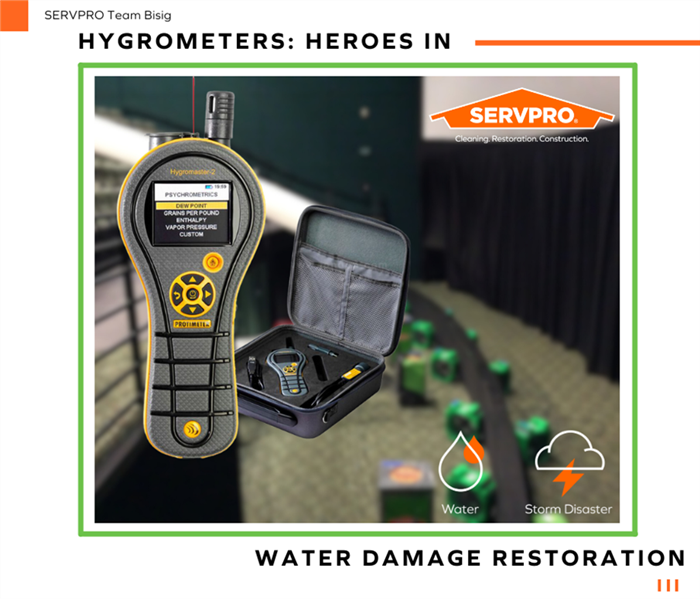 The Protimeter Hygromaster 2 is an effective protimeter that our SERVPRO technicians use here in Forsyth County, GA.
The Protimeter Hygromaster 2 is an effective protimeter that our SERVPRO technicians use here in Forsyth County, GA.
When it comes to effective water damage restoration, specialized tools play an integral role in the process. One of these instrumental devices is a protimeter, a tool that offers precise moisture measurements, which is paramount in dealing with water damage. Here at SERVPRO of Forsyth/Dawson Counties, we use these valuable tools to deliver the best possible service to our customers.
What is a Protimeter?
A protimeter is a type of moisture meter that professionals in the water damage restoration industry frequently use. This handheld device aids in identifying hidden moisture content within various surfaces, ranging from walls and ceilings to carpets and wood. By using a protimeter, our restoration experts can locate the exact source of water intrusion, monitor the drying process, and ensure the affected area is completely dry before completion of the restoration process.
How Does a Protimeter Work?
Protimeters function using two methods: pin and pinless.
The pin-based protimeter uses two electrodes that penetrate into the material to measure the electrical resistance, with higher moisture content resulting in lower resistance. On the other hand, the pinless protimeter uses an electromagnetic field to identify moisture without causing any surface damage.
These devices are invaluable in water damage restoration, allowing professionals to rapidly assess the extent of water damage, pinpoint hidden moisture, and verify the success of drying operations. This ensures all areas, including those not easily seen or reached, are adequately dried, mitigating risks such as mold growth and structural decay.
The Role of Protimeters in Water Damage Restoration
In water damage restoration, timing and precision are crucial. By using protimeters, our SERVPRO of Forsyth/Dawson Counties teams can swiftly identify the scope of water damage and formulate a tailored restoration strategy. Post-restoration, protimeters help confirm that the moisture levels have returned to normal, safeguarding your property from potential long-term water damage effects.
With the use of advanced tools like protimeters, our SERVPRO team ensures effective moisture detection, a key step in the restoration process. It enables us to provide high-quality services, restoring your home or business to its pre-water damage condition efficiently and effectively.
Protimeters: Ensuring Comprehensive Restoration
Investing in water damage restoration is about more than just removing visible water; it's about ensuring your property is thoroughly dried to prevent future problems. At SERVPRO of Forsyth/Dawson Counties, our use of tools like protimeters is a testament to our commitment to deliver comprehensive and professional restoration services.
Water damage can be deceptive, seeping into structural cavities and trapping pockets of saturation. Detecting water within these areas can prove challenging without the right equipment. At SERVPRO of Forsyth/Dawson Counties, we employ state-of-the-art tools, like protimeters, to ensure that all hidden moisture is detected and addressed, offering peace of mind to property owners.
For professional water damage restoration services you can trust, contact SERVPRO of Forsyth/Dawson Counties. We’re here to restore your property "Like it never even happened."
4 Advanced Home Maintenance Tips to Save You Thousands of Dollars in Property Damage: SERVPRO of Forsyth & Dawson Counties
3/9/2022 (Permalink)
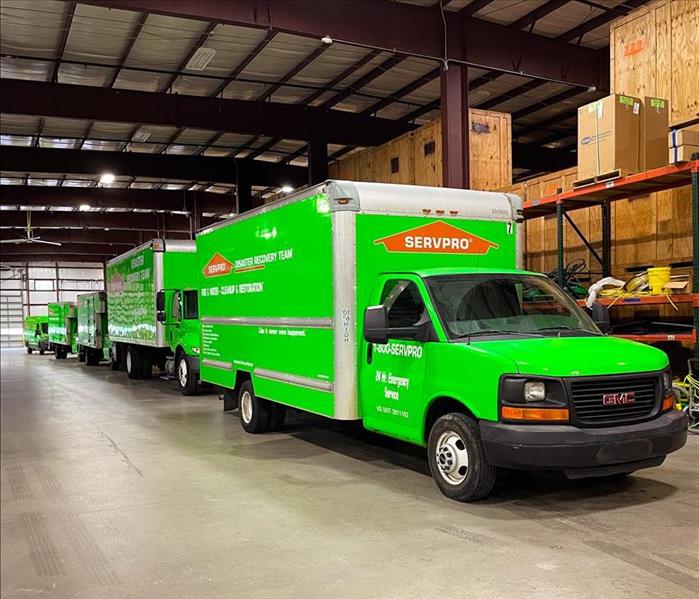 SERVPRO of Forsyth & Dawson Counties keeps its trucks ready to respond immediately to your water damage emergency.
SERVPRO of Forsyth & Dawson Counties keeps its trucks ready to respond immediately to your water damage emergency.
Did you know? An average of 14,000 people experience home water damage emergencies every day.
Water damage is a serious problem that can be expensive and inconvenient in your home or business in Sharon Springs, GA. SERVPRO of Forsyth & Dawson Counties frequently finds that careful housekeeping may help to minimize the danger and costs of water damage repair. The process of water damage restoration, while unpleasant, may be reduced by implementing some basic housekeeping techniques.
1) Inspect & clean the HVAC condensation lines to prevent leaks or flooding.
HVAC condensation lines tend to leak water when clogged and on especially hot months, this can cause water damage and flooding in surrounding areas of your home. Inspect your condensation lines every month and clean them as needed.
You should pour one-half cup of plain, white vinegar four times a year down your condensate drain to clear out gunk and debris. Bleach should not be used since it might spill onto your metal drain pan and cause deterioration and issues. If you find excessive debris or mold, our SERVPRO professionals can help you cleanup any water damage.
2) Inspect and clean the roof and gutters of debris and check attics for signs of water damage.
Clogged gutters can cause rainwater to back up and overflow onto your roof, which can damage the roofing material and seep into the home.
Check for leaking flashing around vents, valleys, chimneys, pipes, and skylights. Any place where your roof has holes or joins is a potential source of leaks later on down the road. If this flashing becomes bent, rusted, or loses its seal, it might allow water to enter your property.
Examine your attic for moisture or mold growth. If you detect damp, damaged, or moldy insulation, rotted or discolored boards or ceiling panels, or puckering in the sheetrock, you may have a leak on your hands.
3) Have a professional inspect your plumbing system
One of the best ways to avoid needing emergency water repair is by scheduling plumbing maintenance. Maintenance allows a plumber to check your plumbing system for any developing corrosion or pinhole leaks that you may not notice otherwise. They can also try to determine when your plumbing system will need repairs, so you aren't caught off guard by any water leaks in the future.
Meanwhile, avoid flushing unusual or insoluble objects down toilet drains to prevent clogging that leads to floods. If you experience three or more water leaks in less than six months, your pipes may need to be replaced.
4) Test your sump pump thoroughly for possible water leak issues
A sump pump protects your home from heavy rains and rising waters that leave behind enormous repair costs and structural damages.
Conclusion
It is important to be proactive about home maintenance and repairs in order to prevent water damage events from happening in the first place. However, if a water damage event does occur, it is important to have a plan in place for how to deal with the aftermath. Our team of experts at SERVPRO of Forsyth & Dawson Counties is Here to Help!
Call us today: (770) 887-1962
What to Do About Water Damage Until Help Arrives
2/14/2022 (Permalink)
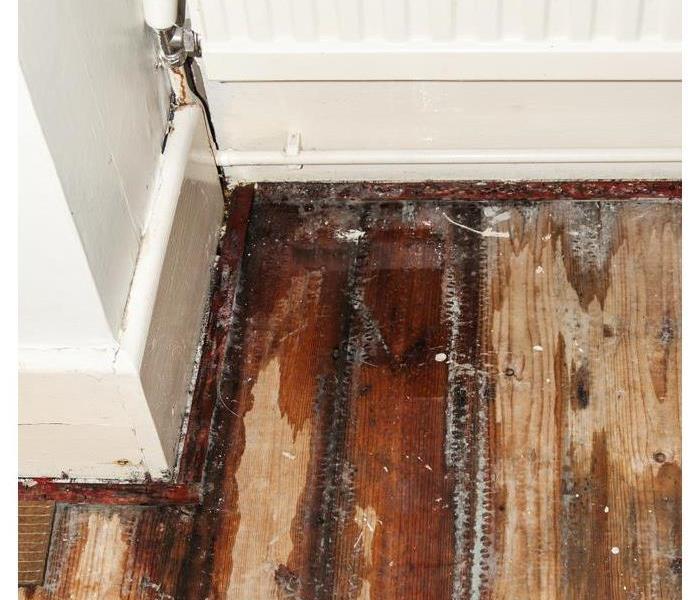 Water damage in Talking Rock, GA.
Water damage in Talking Rock, GA.
Water Cleanup
Dealing with water damage in Talking Rock, GA can be complicated. Regardless of if the broken pipes only affected one room or if the entire house needs to be dealt with, you always want to contact a professional team to come out and address the issue. You do not want to make the situation worse by trying to fix pipes on your own; leave the water cleanup to the experts.
1. Determine If It Is Safe to Stay in the House
At the end of the day, you want to ensure everyone in your family is kept safe. This requires you to determine what the “slip and fall” risk is within the house. You also need to be incredibly wary of electrical fixtures affected by the flood water. Stay out of any rooms where the ceiling is sagging, and do not turn on a ceiling fan if that is the case, because water damage can make fans unstable.
2. Ventilate the Rooms
You can help the professional water cleanup crew by beginning the ventilation process as soon as you can. You should open up any windows in the room and run the air conditioner. This will help dry down the room and delay mold growth. It will not prevent mold and mildew entirely, so you still need to contact a professional team to address every danger in a room.
3. Salvage What You Can
You do not want to put yourself in any danger by reaching into potentially contaminated water, but you can attempt to retrieve items affected by water damage. Wet fabrics can be removed and hung outside to dry. You can also pull out magazines and books to help the pages dry sooner. Do not plug in any electronics until you know for certain they are dry. Water remediation in Talking Rock, GA can be dangerous work, so leave the heavy lifting to the experts.
Don’t Get Short-Changed on Your Burst Pipe Claim
1/26/2022 (Permalink)
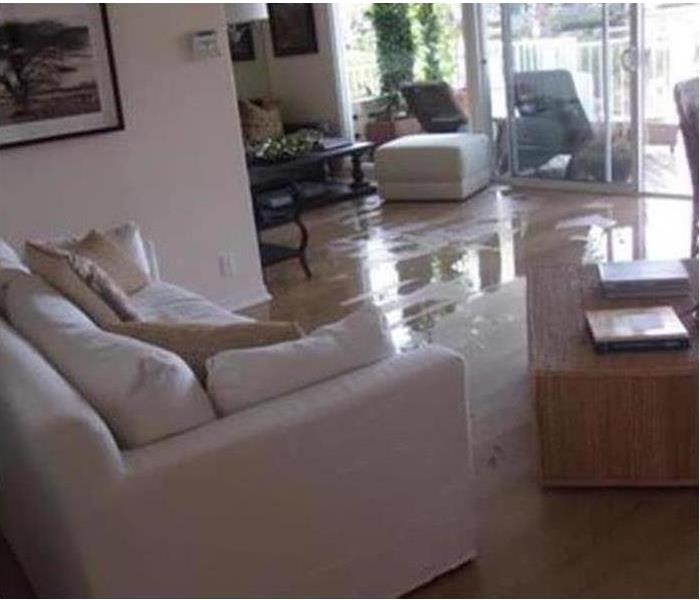 Bursting pipe causes damage in a living room.
Bursting pipe causes damage in a living room.
Don't Let Your Claim For a Burst Pipe Go Unpaid
You care enough about your home in Jasper, GA, to protect it with an insurance policy covering water damage, but are you sure you’ll fully recover your losses if bursting pipes unleash buckets of water inside your home? Here are some ways you can help ensure you won’t come up short.
1. Document Everything — Before and After
Before taking steps to fix broken pipe damage, document everything affected. Don’t throw away anything that’s been damaged beyond repair; take pictures of everything first or make a video.
It’s a good idea to also take photos or videos of your house and belongings when you first get your policy or when you make changes to your home. A before-and-after damage demonstration can help substantiate your claim.
2. Know What Your Policy Terms Mean
Be aware of any exclusion and exception terms in your policy. Find out from your agent what all the terms mean; certain types of damage from bursting pipes may not be covered. Water damage from long-term gradual pipe leakage, for example, may be excluded; only sudden or accidental damage may be covered. An adjuster could then conclude that damage reported in a claim could have been prevented if you had not neglected certain maintenance, inspection or repair issues.
3. Be Proactive; Get Inspected and Have Maintenance Work Performed
To help prevent a claim denial based on gradual or long-term leakage, have your plumbing system inspected regularly by licensed professionals. Obtain inspection reports and keep records of all maintenance or repair work performed.
4. React Quickly and Call In a Reliable 24/7 Clean-Up and Claim Inventory Service
Contact a professional 24/7 emergency clean-up service as soon as possible. You’ll want to choose one that provides a thorough and reputable contents claim Inventory service.
You’ll be better prepared to file a claim with sufficient picture and paper documentation, a full understanding of policy terms and a proactive approach to inspections and maintenance. Taking these steps can help you gain the confidence that you’ll be fully covered if your home in Jasper, GA, is damaged by bursting pipes.
3 Things You Must do When Replacing a Leaking Toilet
12/28/2021 (Permalink)
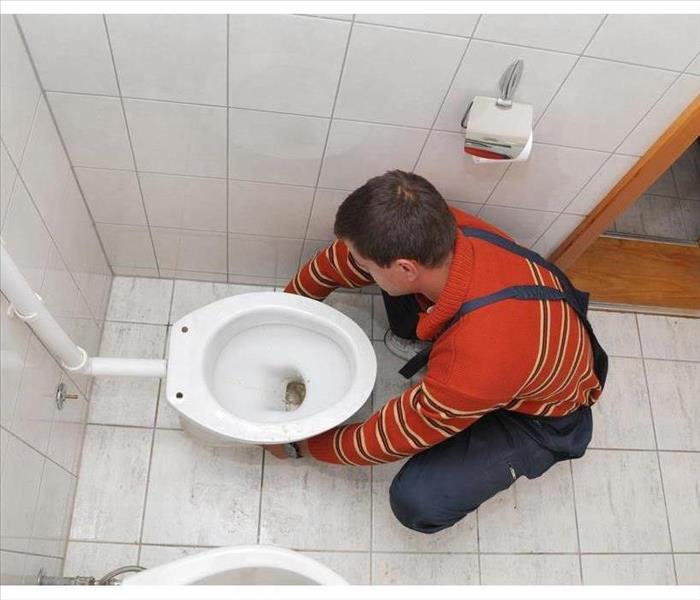 Replacing a leaking toilet in Cumming, GA.
Replacing a leaking toilet in Cumming, GA.
Three Things to Do When Replacing a Leaking Toilet
Replacing a home toilet is a doable job that requires some preparation and basic technique. If your old toilet has left you with serious residential water damage in Cumming, GA replacing it promptly is highly suggested. When you are ready to swap out your old leaking toilet with a newer model, be sure to check out these 3 important tips for a safe and smooth transition.
1. Properly Drain the Toilet
Before a new toilet can be installed, proper drainage and removal of the old fixture is critical. Start by shutting off the water supply using a wrench. Close the valve and completely drain the toilet by holding the flush handle until the water is emptied from the bowl. Continue this process until little to no water can be found before proceeding with toilet removal. Beginning with a drained toilet can:
- Prevent a messy toilet repair job
- Help to lighten the toilet before removal
- Evade further possible water damage
2. Lift the Toilet by the Bowl
After draining a leaking toilet, you must be prepared to remove the fixture from its current place. Before lifting the toilet, be sure to get a firm grip around the bowl. Never lift an old toilet by the tank. Lifting from the bowl prevents the weight of the toilet from breaking upon removal. Prepare an old sheet or piece of cardboard beforehand to catch any water that may be left inside.
3. Replace the Rubber Gasket
Once the older toilet has been taken out, it may be tempting to jump right into installing the new one. If you were dealing with a leaky toilet, it may be wise to replace the old rubber gasket before installing a new fixture. These gaskets are fairly inexpensive and can prevent serious water damage in the future.
While these helpful tips can guide you in a replacing your leaking toilet, repairing water damage in Cumming, GA is a job best left to a professional water restoration service. Always turn to a professional to help assess your water cleanup needs.
Half of All Businesses Never Reopen After a Disaster
11/29/2021 (Permalink)
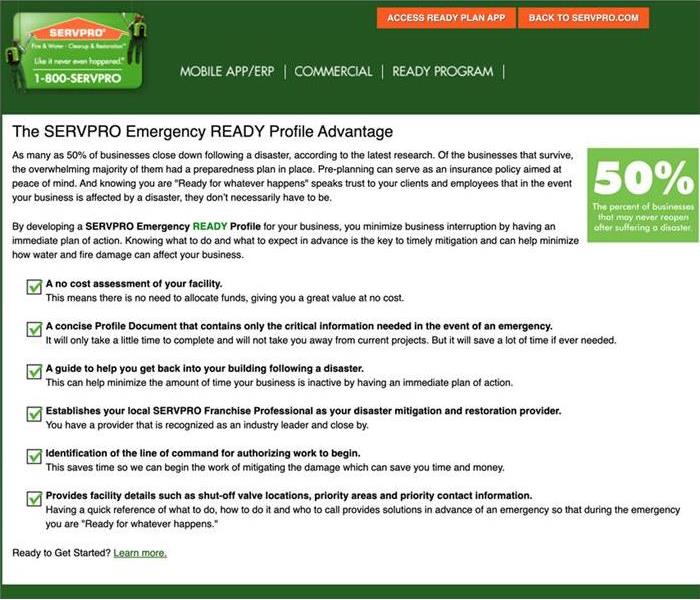 The emergency ready profile contains a wealth of information to help you get reopened.
The emergency ready profile contains a wealth of information to help you get reopened.
The only thing certain in the world today is uncertainty. Disasters in Amicalola, GA, both natural and man-made, are increasing for a multitude of reasons. After the worst has passed, studies show that 40 – 60 percent of businesses will permanently shut down. Of those who survive, the majority are prepared with an emergency profile.
Disasters Are Everywhere
There are so many potential catastrophes facing business now, they’re impossible to list. Some of the most common types include
- Natural disasters
- Fires
- Riots
- Major infectious events
- Cyberattacks
- Fraud
Each type has many subtypes, as well. Cyber-attacks may shut down a business website while ransomware can lock down an entire local operation. More than one can occur at once, and when they do, the majority of businesses are wiped out.
Resilience is Everything
FEMA says that a whopping 90% of small businesses will fail within a year if they don’t reopen within 5 days. However, the overwhelming majority of businesses that do survive have an emergency profile ready before a disaster.
Survival in Steps
SERVPRO has helped many businesses meet the FEMA-recommended standards for business resiliency. Their Emergency READY Program is the industry-leading disaster plan available. Even better, it starts with a free assessment of your facility.
Once you visit the SERVPRO ERP website, you can create an account and download the free ERP app on your smart device. You can also call SERVPRO for technical support or any customer service needs.
There’s a local SERVPRO branch in your area. You may have several to choose from, but you can pick whichever one you prefer to act as your representative to deal with insurance companies and other contractors if you wish. Then you can begin creating ERPs for every property you own.
The ERP app not only helps you with your emergency profile, it contains a wealth of information to help you get reopened. It’s available through the cloud, so if you lose access to information in your building, you’ll have it anywhere you have internet access. You’ll have all the facility information you entered at the touch of a finger!
Everything You Need To Know About Drain Cleaners
10/13/2021 (Permalink)
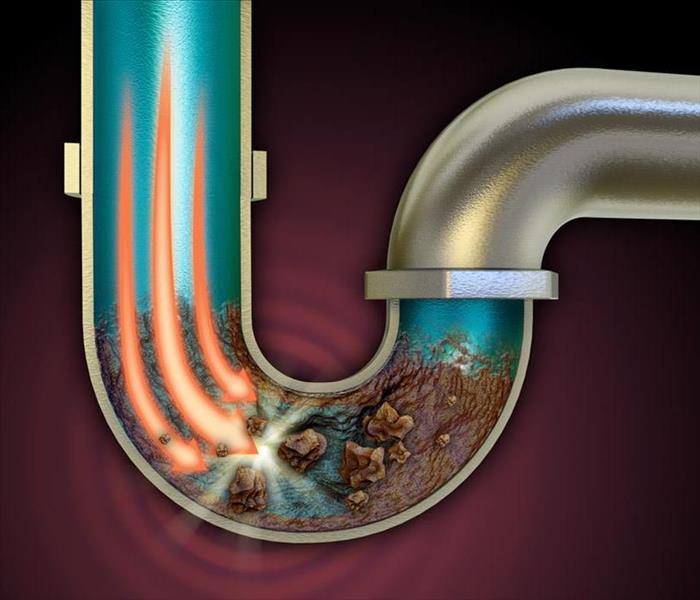 Drain cleaners have some properties that can damage your pipes.
Drain cleaners have some properties that can damage your pipes.
When you are dealing with a clogged drain at home, it may sound tempting to just pour a chemical cleaner to eliminate the problem. However, this is not always the right solution. Drain cleaner has some properties that can damage your pipes and wreak havoc on your home in Cumming, GA. Educate yourself about this type of cleaner to use it appropriately.
The Basics of Chemical Cleaners
Liquid cleaners used in sewage cleaning can be either oxidizing, caustic or acid. No matter the type of chemicals, they create heat that dissolves organic blockage such as food, hair, or grease. Specifically, the cleaner triggers an electron transfer that either adds to or removes electrons from the organic matter. The heat generated by this exchange then weakens the clog, making it easier to flush away.
Potential Damage and Consequences
Despite the convenience of these cleaners, they are not ideal for every clogged drain case. There are specific situations where they can damage the pipes.
- Plastic pipes
- Older and weaker metal pipes
- Complete drain blockage
The strong chemicals can diminish the pipes, leading to extensive water damage that only an emergency remediation service can fix. They also have secondary effects on both your health and the environment. Prevent these consequences by limiting use to partial blockage made of organic materials and only as a last resort when alternatives fail.
Alternatives to Cleaners
There are a couple of solutions to try before deploying a drain cleaner. First, you can go the mechanical route by using tools to manually unclog the drain. Augers and plunges are the most common devices for this method. If it does not work, try enzymatic cleaners. These products contain enzymes, or bacteria, that break down the clog. They usually take a day to unblock the pipe, but they are a safer option.
While chemical cleaners are a fast solution for a clogged drain, they are not always effective and should be used when out of options. Ensure your situation meets the right criteria before using this agent.
Is All Flood Water Dirty?
6/25/2021 (Permalink)
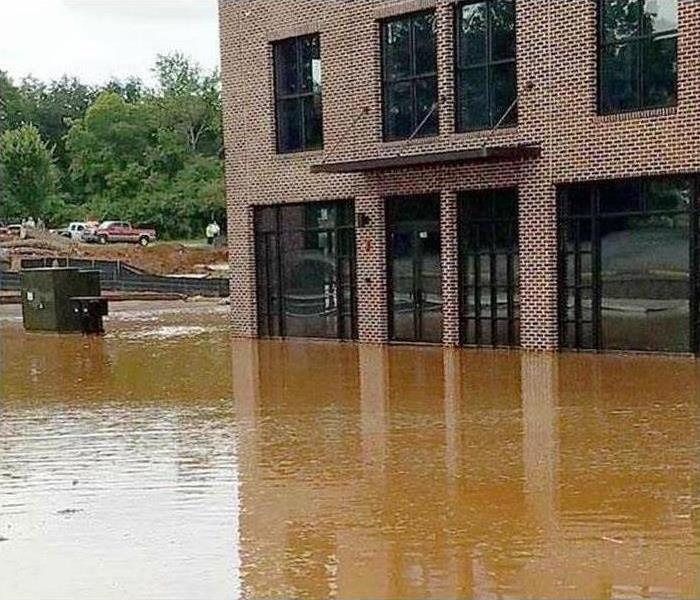 Floods can happen quickly.
Floods can happen quickly.
Why Are Floodwaters Dirty?
If you have dealt with any sort of flooding in your Dawsonville, GA, home, you may have heard the water damage cleanup crew talking about dirty water. Typically, the waters that fill a home fall into one of three categories:
As a homeowner, it can be beneficial for you to have some understanding of these different types of floodwater. Learning what makes contaminated water contaminated can help you better assess emergency situations in your house.
Category One
The first category of floodwater is often called clean. If the flood source is a broken supply line or leaky shower head, chances are the water does not have any contaminants in it. While any water can do damage to your home, anything from a clean source is easier to clean up if addressed quickly because it does not already contain spores and bacteria.
Category Two
The second category is contaminated water. Some professionals may refer to it as gray water. Floods that fit under this description contain bacteria and viruses. Often, this flooding comes from some type of appliance overflow. The water that seeps out of your dishwasher hose, for example, may have some bacteria already in it.
Category Three
The third category is called black water. This is the most contaminated flooding that can affect your home. Sewage backup and outside water often fall into this category. This type may have feces, microbes and harsh chemicals in it.
Degradation
Even if your flood starts off as clean, you need to address the water buildup as quickly as possible. Even clean water can start to degrade. As the water from your supply line runs through your walls and into your basement, it may pick up bacteria that turns it into category two water.
What To Do When Sewage Water Contaminates Your Home
3/9/2021 (Permalink)
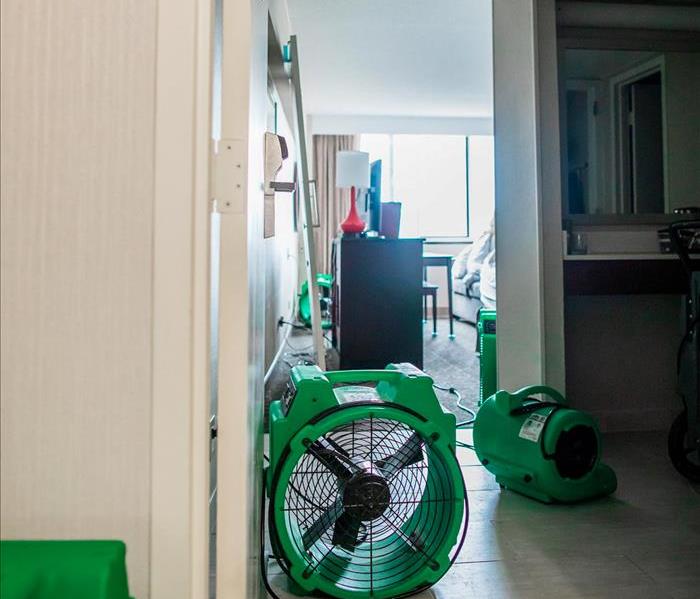 Be sure to call a professional to clean up any sewage
Be sure to call a professional to clean up any sewage
Sewer cleanup is not simple. The water is quite dirty and can create several concerns for the home's structure; therefore, when wastewater invades a house's space, it's best to act quickly, working with professionals to understand the cause and begin proper cleanup measures. Be aware of the answers to the following three questions.
How Does Sewer Water Get Into the Home?
A sewer backup may occur from several factors. Tree roots may grow into the exterior pipes, breaching them and blocking the flow. Toilet lines clog when large or harder substances go down the tubes and cannot leave the system. During intense storms, overflows may displace fluid. No matter the cause, the effect is the water cannot correctly exit; thus, it flows into the home through the closest portal (often the commode).
How Should You Handle Sewer Contamination?
Sewer cleanup requires meticulous and prompt attention. The dirty liquid quickly contaminates the space. Focus on two things: dry out everything and sanitize as best as possible. The following steps should be completed:
What Should Be Replaced?
A flooded toilet from a backup issue delivers category three water into the home. This fluid contains high levels of waste and bacteria. As it spills onto the floor, it seeps into the materials and eventually reaches the walls. These porous materials are unlikely to be cleaned with traditional methods because they absorb so much. It’s best to toss these sponge-like items to ensure proper cleanup occurs.
Owners may choose to keep nonporous objects, but they should still be scrubbed with warm water and soap. Spray with antimicrobial spray.
For effective sewer cleanup, homeowners must carefully inspect everything for water infiltration. Lower moisture levels and get rid of contaminated belongings, then, call SERVPRO of Forsyth and Dawson Counties.
4 Ways To Dry Soaked Documents
2/11/2021 (Permalink)
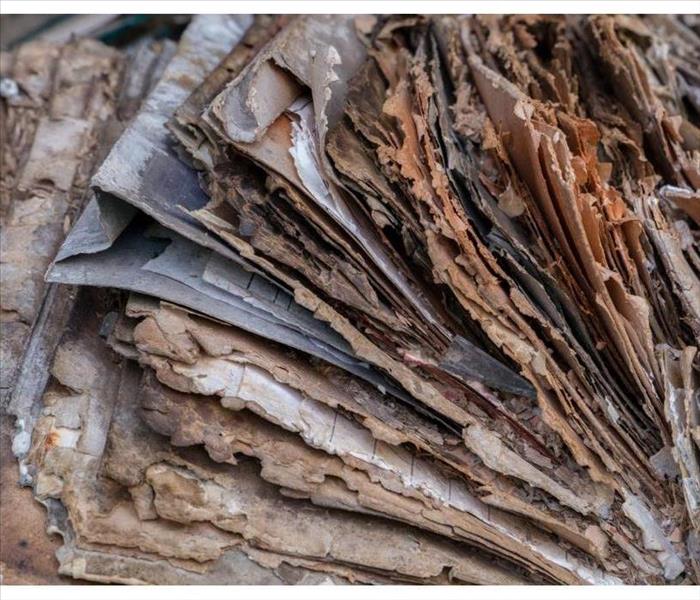 Wet documents can be restored
Wet documents can be restored
Four Methods For Salvaging Your Company's Records
If your business in Coal Mountain, GA experiences flooding, it is possible that your building suffers enough damage to require the services of expert water restoration professionals. Additionally, archives may become soaked. Fortunately, wet documents can be recovered.
1. Freezing
Wrap reports in wax paper, parchment, or sealable plastic bags and then place them in a freezer. If you have time, apply separators between each piece of paperwork. Once your materials have thawed, follow up with one of the below procedures.
2. Air Drying
This option is best for smaller bundles of compromised files. Begin by spreading your items on flat tables. Place fans near your papers, but be sure that the airflow is indirect; otherwise, they may go flying. Blot dampened pages with a soft cloth or towel and then hang them on a clothesline with plastic clothespins. Note that it may take up to two weeks for some wet documents to completely dry.
3. Vacuum Freezing
Vacuum freezing is a better choice when a lot of document drying becomes necessary. Freeze your papers as outlined above and then place them in a vacuum chamber. This piece of equipment can be obtained from a salvage vendor. By using a process known as sublimation, ice crystals vaporize without melting. This assures a minimum of additional stress on the affected reports.
4. Vacuum Thermal Drying
Records that have suffered watery ravages ranging from minor pipe leaks to intense flooding can benefit from vacuum drying. Items are placed within one of these enclosed devices and dehydrated via moisture evaporation. Only use this method with records that do not need to be kept for long periods, as this strategy accelerates aging.
Wet documents are a severe problem for any business, but all is not lost. There is a good chance that a majority of your data may be able to be saved with one of these approaches.
4 Ways Water Can Damage Your Home
12/28/2020 (Permalink)
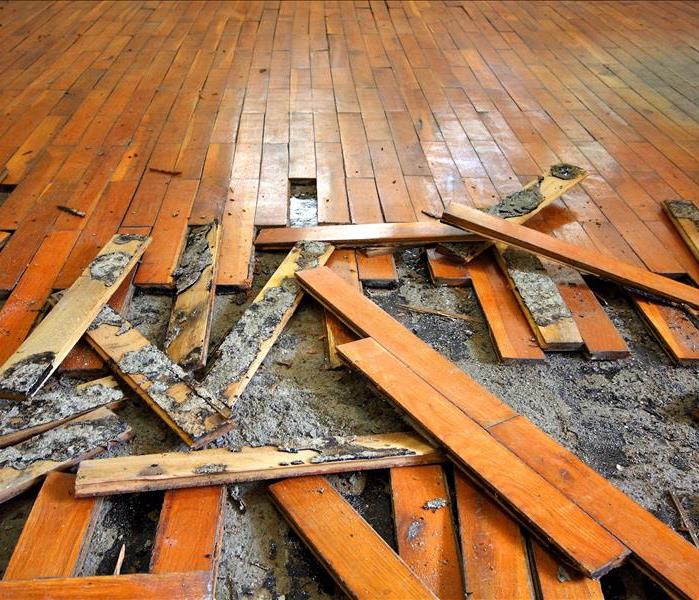 Wooden floor damaged in a Dawsonville, GA home
Wooden floor damaged in a Dawsonville, GA home
4 Ways Water Can Damage Your Home
Is your home in Dawsonville, GA, prone to flooding or heavy rains? It's important to know what kinds of damages, such as swelling wood, water can cause to your home.
1. Walls and Supports
If hail or heavy wind often accompany rainstorms near you, water can quickly get past the standard plastic siding. The hail can break big holes, and the wind can blow water up and behind the siding. Once this happens, there's only a small, thin sheet of wrapping that separates the water from the plywood of your home's structure. Other supports like wooden porch beams are also vulnerable. A common issue after heavy rains is swelling wood. This occurs when the wood is saturated with water and starts to expand and swell. This can compromise the structural integrity of your home.
2. Windows
While it's exciting and fun to watch rain pound against windows while you're safe and cozy in your home, windows are a big structural weakness that require consistent maintenance. The caulking, a type of rubber-like sealant used by workers when your windows were installed, can sometimes come loose, especially if you own an older home. If this happens, water can slip through the cracks between the window and its frame, which will cause water to directly enter your home.
3. Water Pipes
Water pipes: the tangled rat's nets of copper that everyone likes to put out of their mind. Yes, these can be impacted by heavy rains, too. The issue of swelling wood can put pressure on pipes, especially where water enters your home through the exterior in a supply line. It's best to keep an eye on your pipes and consider beforehand how a heavy rain might impact you. If you have the unfortunate luck to suffer a pipe break, however, you can always contact a water damage specialist to quickly clean up the damage.
4. Yard
Your kids might love to splash and play in the mud after a heavy rain, but these downpours can have other, less entertaining, side effects. If there is enough rainwater, or if your home has an inefficient gutter system, rushing water can wash away the dirt around your foundation. This can lead to basement leaks or even crack your foundation if the water freezes after it seeps through the concrete.
As an informed homeowner, you can help prevent water damage before it happens and avoid costly issues such as a water pipe repair.
Preventing Water Damage When You're Away from Home
11/23/2020 (Permalink)
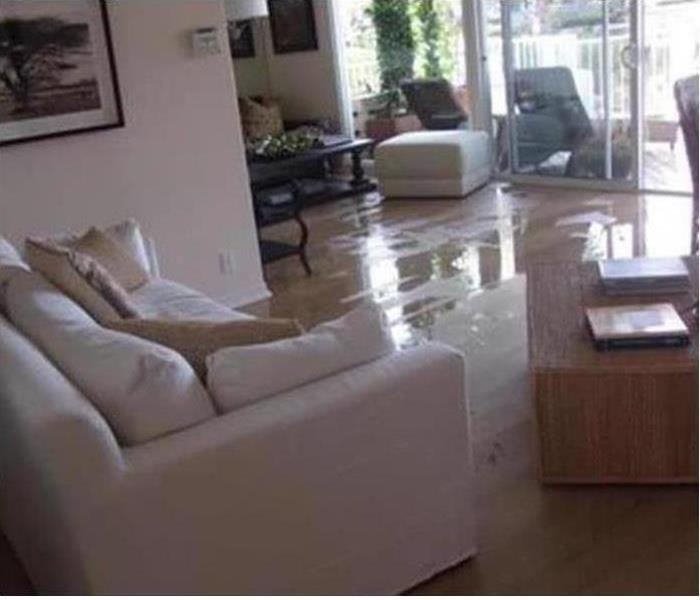 Water damage in Cumming, GA
Water damage in Cumming, GA
Preventing Water Damage When You're Away from Home
A broken water pipe is one of the most common causes of damage to homes in Cumming, GA. If you're home when the disaster occurs, you have the ability to act fast to ensure it is cleaned up and you're able to call someone to perform your water pipe repair. If you're away when it happens, such as on vacation or an extended business trip, you could come home to a major problem.
Know the Common Causes
Knowing what causes a broken pipe can help you protect against it happening. The most common causes of water pipe breaks are:
- Freezing temperatures
- Corrosion
- High water pressure
- Clogs
- Tree roots
You don't want to have a pipe break at any time, but especially while you're away and unable to make sure a water pipe repair and cleanup happens. You would return to a flooded home with secondary damage, including structural and mold. If you experience this type of damage, always work with a professional restoration company so you and your family remain safe.
Preventing Pipe Breaks
Before leaving town for any amount of time, always know your pipes are in good working order. Inspect under your sinks and around the water heater. Also check the hoses around your appliances, such as your washing machine, refrigerator, and dishwasher. If hoses look worn, replace them.
If the temperatures are going to be cold while you're away, provide your pipes with insulation. You should be doing this anyway. Make sure your outdoor hoses are disconnected and your spigots are covered with bib protectors.
Last, find a friend or family member to check in on your home often. If you don't have someone who can do this, shut off the main water and drain the pipes. Flush the toilets to empty them as well, and leave your cupboards under the sinks open to help keep the pipes warm.
You want to be home when there is any need for a water pipe repair. A busted water pipe will always cause a mess, but it doesn't have to cause damage. Damage is preventable when you take the extra steps to be proactive.
Is Your Shower Leaking?
10/13/2020 (Permalink)
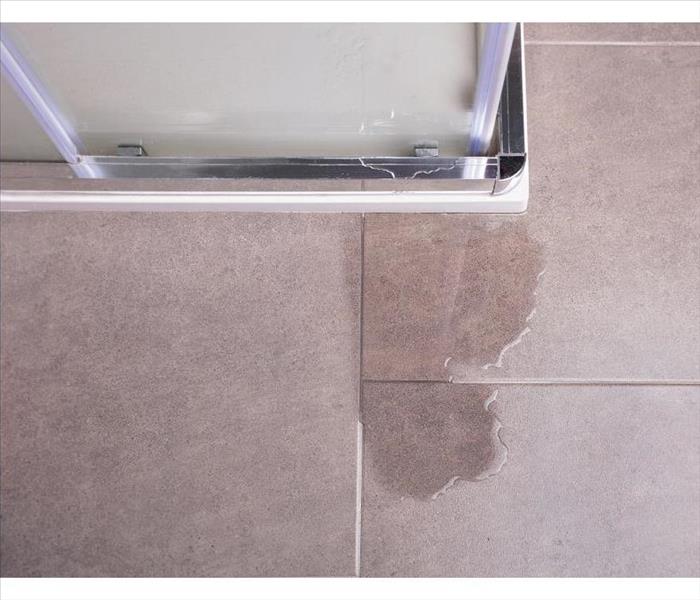 Signs your shower is leaking
Signs your shower is leaking
A shower or bathtub leak might be a common household issue, but that doesn't make it any easier to deal with. The water damage that a leaky shower can potentially cause only serves to pave the way for subsequent issues, such as unwanted mold growth. If you suspect that your home in Dawsonville, GA, might have a leaky shower or bathtub, take a look at the following tips.
Signs Your Shower is Leaking
The following are some of the most common, tell-tale signs that your shower or bathtub is leaking:
- Peeling, flaking or otherwise morphed bathroom paint
- Water stains in the ceiling on the floor directly below your shower or bathtub
- Mold or mildew growth in your bathroom
Identify the Source of the Leak
A shower pan leak can come in several different forms, and it's important to identify the issue before you set out to fix it. It's possible that your shower or bathtub leak is simply the result of an inadequate seal. Try spraying water all around the shower, including up against the glass or closed curtain, to see where the moisture is escaping from. Also make sure to check your shower's caulking, as these materials can crack and break as they age, losing their effectiveness. If you can identify where the water is escaping from, then your shower leak is simply a matter of replacing the grout or caulking. If doing so doesn't yield any definite results, your leak might be related to a shower tray or drain issue. If this is the case, you should hire professionals to test for leaks.
There are several different incidents that could have caused your shower or bathtub leak. Regardless of where the leak came from, you need to take the situation seriously and take immediate action to remedy the problem. Water damage can wreck havoc on your residential property if left untreated. If you can't identify the source of the leak or need help fixing the damage, contact water remediation experts for professional assistance.
 SERVPRO of Forsyth & Dawson Counties is here to serve you 24/7/365 whether you live in Big Creek, Cumming, Vickery, Chestatee or anywhere in between.
SERVPRO of Forsyth & Dawson Counties is here to serve you 24/7/365 whether you live in Big Creek, Cumming, Vickery, Chestatee or anywhere in between.





 24/7 Emergency Service
24/7 Emergency Service












